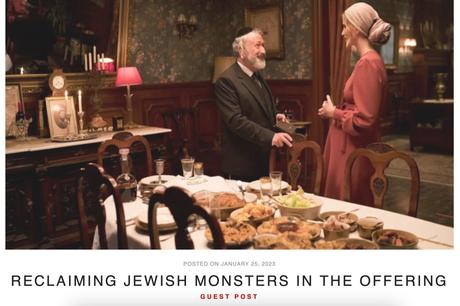I get to feeling a bit anxious when nobody else publishes me for a while. It’s a strange kind of validation, I suppose. No matter my motivation, I knew as soon as I saw The Offering that I would have to write something about it for Horror Homeroom. The article is now available here. Horror, as one of the more intelligent genres, often has much to say about things such as religion and esoteric beliefs. In the article I compare it to other recent Jewish horror such as The Possession, The Golem, and The Vigil. All of them are worth watching. Religion often addresses those things that scare us, whether secular or sacred. Movies like these often make me ponder the sense of belonging that religious communities offer. At least in the best of times.

These three movies each have their own posts on this blog, but the point of the Horror Homeroom article is to try to look at them together. Judaism can be a particularly delicate topic. Not only the Holocaust, but also subsequent political developments have led to dangerous situations for Jews in the real world. Theirs is an old and rich culture, persecuted largely by Christians who ironically blame Jews for their own salvation. And hate them for it. Nevertheless Jewish culture and belief persist. It’s telling that even when they invent a protector, such as the golem, they come to realize that it too will turn on them in the end. Most horror movies, if they participate in religious worldviews, do so from a Christian point of view.
Some colleagues recently asked me to name some Protestant horror movies. That’s a tricky question to answer because the American context is still largely Protestant as a whole. And when you want to take on monsters and demons you generally call a priest. Even movies like The Last Exorcism have Protestant clergy using Catholic crucifixes. As I’ve stated elsewhere, Asian horror movies have also come into their own, often reflecting Buddhist or Hindu outlooks. So we find religion and horror intermingling worldwide. Movies are more than just entertainment. They can be, and are, teaching tools. We should pay attention to what goes on in their classrooms. Not only can we learn about ourselves, we can also learn about those that we, or society, tend to “other.” Like high school, there are a variety of classes you might take. The day always starts, however, with homeroom.
